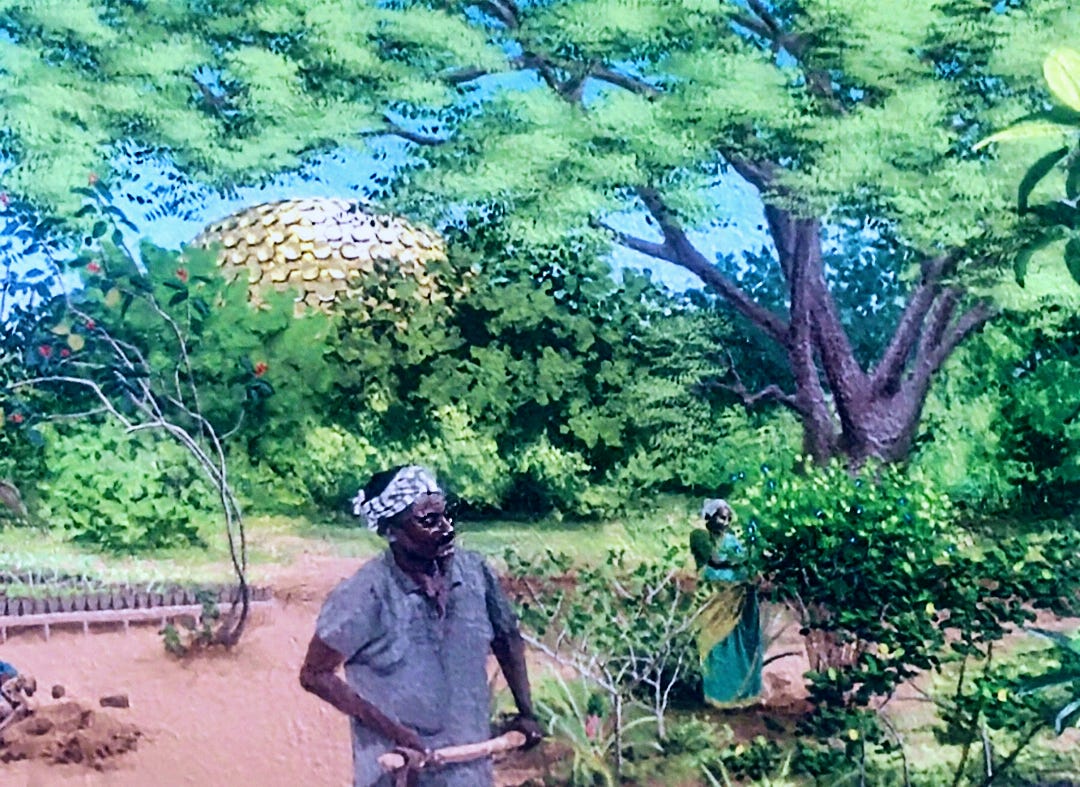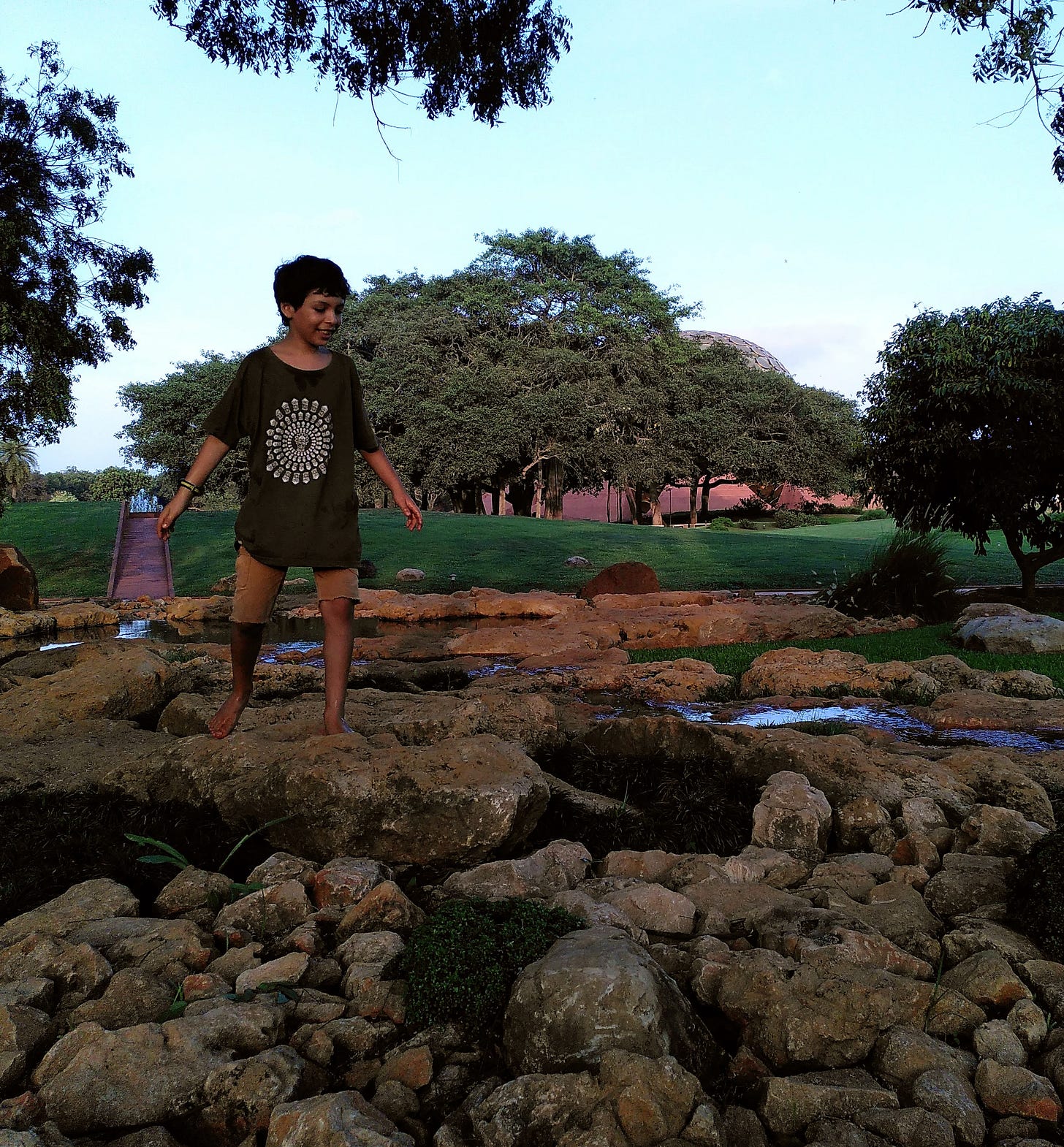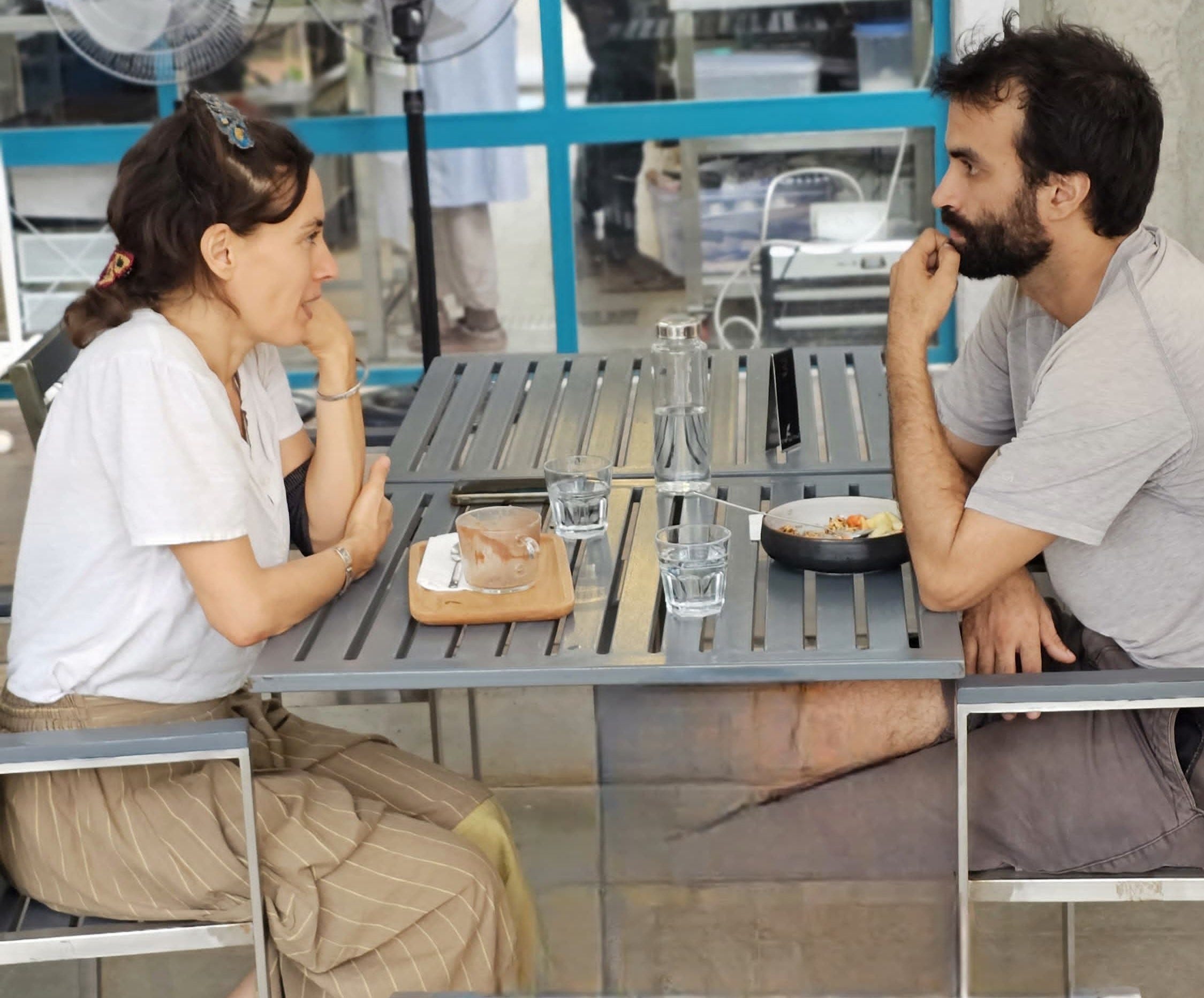[Image : wall painting, Solitude Farm, Auroville]
***English below***
Qu’est ce que l’esprit de synthèse proposé par Sri Aurobindo et porté par Mère, notamment dans sa proposition de Ville expérimentale tournée vers le futur (Auroville) ? Où en sommes-nous aujourd’hui, de notre capacité d’intégration de nos différents héritages culturels et ethnographiques ? Quelle est la place des savoirs indigènes dans la synthèse épistémologique à laquelle notre époque nous appelle ? Voilà les questions qui m’animent et que je vous propose de contempler avec moi ci-après.
Notre époque : entre synthèse et intégrisme
Si les aborigènes d’Australie considèrent internet comme une simple démonstration d’une interdépendance sous-jacente à notre réalité (Glowczewski), le réseau digital met bien aujourd’hui en lien les mentalités de l’espèce humaine pour précipiter de nouveaux espaces de rencontres, notamment rencontres intellectuelle, culturelle et axiologique. Il en est de même pour la globalisation des échanges dont mes cours d’économie parlaient déjà il y a 20 ans, qui nous permettent de consommer des plantes anciennes développant notre sensibilité aux joyaux des traditions natives, ou d’écouter des Kogis de Colombie faire un diagnostic de nos territoires européens.
Pourtant, la rencontre n’est pas toujours synonyme d’entente et d’apprentissage mutuel, surtout lorsqu’elle est réalisée avec peu de cadre intentionnel au service d’un plan élargi. Les déboires de notre collectif humain incapable de s’ajuster convenablement à la hauteur des idéaux onusiens - et autres paradigmes de sagesse ancienne (comme les traités inter-Nations-Premières ayant précédé la colonisation des Amériques) ont certainement poussé certaines personnalités à prôner l’importance de théories intégrales et unifiées de la réalité (Lazlo, Wilber). Ainsi soufflent les vents contraires aux intégrismes, nationalismes, génocides et écocides aux longues traînées sanglantes sur la surface de la Terre.
Avec sa Synthèse des Yoga, Sri Aurobindo pose les jalons d’une telle réflexion intégrale et unifiée, dans une qualité de raffinement et d’exigence uniques, reconnue par les plus grands érudits e visionnaires de notre époque. Sri Aurobindo se fonde certainement sur son évidente gnose, née de ses propres expériences de vie profondément alchimiques et initiatiques.
Là encore, il est tentant de penser que le « nouveau » Yoga intégral proposé par Sri Aurobindo nous invite à délaisser tous les autres systèmes de connaissance, à les balayer d’un coup de manche, sous prétexte qu’ils ne nous servent plus aujourd’hui. Et à les balayer de plus en plus violemment, à force de bulldozers et glaciale indifférence...
Cependant, l’invitation de son approche intégrale est bien l’intégration, et non le rejet, de l’ensemble des voies et des perspectives. Le point de convergence est le processus de transformation que ces voies suscitent : l’éveil de l’être intérieur et la mise en cohérence de nos dynamiques de vie pour répondre à ses élans épurés.
Auroville, synthèse ou pot pourri
« Au lieu de faire une synthèse, ils font un pot-pourri. Ils ramassent tout, le mélangent, le fouettent un peu, utilisent un tas de mots qui n'ont rien à voir les uns avec les autres, et ils vous le servent ! »
La Mère
[Intention de départ] Depuis le début, Mère a présenté Auroville, le projet expérimental dédié à Sri Aurobindo et à son esprit de synthèse transformateur, comme un lieu où tous les contraires devraient se côtoyer, toutes les « impossibilités » se concentrer. C’est seulement de cette manière que la Ville pourrait jouer son rôle de passage, de pont, vers une unité humaine futuriste. L’arcane de l’enseignant, Guru, n’est-il pas celui qui fait le lien entre l’ombre -Gu, et la lumière -Ru ?
[Aurodisney] Une des projections d’Auroville, c’est ce qu’on appelle avec humour « Auro-disney » : on y trouve un patchwork de cours de yoga acrobatique, salsa, arts déco naturels, des smoothies à la mangue et du silence réconciliant dans le temple central. Les touristes se pressent dans cet Auroville-là, un large pot pourri étourdissant, voilant une tendance non intégrale et intégrative, mais bien capitaliste et fossoyeuse.
[L’enjeu persistant] L’Auroville intérieur, c’est une expérience indélébile qui nous touche pour la vie entière et qui persiste, parfois durement, pour interroger notre identité et notre rapport au monde. L’impossibilité actuelle d’Auroville de se présenter au monde dans toute sa cohérence, est celle qui pointe vers une synthèse encore plus élargie des forces conflictuelles en présence. Les défenseurs des arbres et, plus largement, des procédés de développement inclusifs et bio-mimétiques, devront trouver comment ne pas se faire éteindre par ceux qui représentent l’ordre incompressible et pyramidal d’une organisation préconçue de manière unilatérale.
« Lorsqu’en apparence deux idées ou deux principes semblent se contredire, il faut monter un peu plus haut dans la pensée et trouver le point où les contradictions s’unissent dans une synthèse compréhensive. »
La Mère, 29 mai 1957
Recherche ontologique
L’histoire d’Auroville aujourd’hui révèle un mouvement global de réveil et de (re)valorisation progressive des modalités évolutives natives, forestières, animales, organiques, féminines, indigènes, dans le « Cercle des Nations ». Ce Cercle des Nations, tout clinquant, médiatique et corrompu qu’il est, a oublié de se construire avec les Premières Nations, qu’il a d’ailleurs anéanties avant même de mettre en péril la race humaine toute entière, avec l’avènement de ses guerres mondiales aux armes blanches, puis nucléaires et biologiques. Triste histoire qui légitime certainement notre franche amnésie de ce qu’il y a pu avoir « avant nous ».
A Auroville aussi, s’il y a des Pavillons nationaux, souhaités par Mère comme ds fleurons vibrants de chaque culture du monde, il n’y en a aucun dédié aux peuples indigènes.
En co-fondant l’Institut des Savoirs Indigènes, je souhaite adresser cette situation. Il s’agit non seulement d’une tentative de représentativité (géo)politique planétaire, mais bel et bien d’une invitation à la recherche approfondie de ce qui se cache derrière les savoirs des peuples effacés de la carte.
Dans la continuité de l’oeuvre de Sri Aurobindo, je propose de considérer les systèmes de connaissances indigènes comme des voies à part entière pouvant apporter leur pierre à l’édifice de la synthèse (encore non achevée et non incorporée) de notre identité humaine.
Dans la continuité du projet aurovilien, je propose d’ajouter à l’aventure vivante et tout terrain de nos pluralités, celle de l’étude des savoirs indigènes, leur manière de générer de la connaissance et de définir leur relation à l’existence.
Trouverons-nous un lien entre la pratique des Chamanes végétalistes d’Amazonie et celle des Yogis Siddhas himalayens ? Et entre la vie du Pharaon et celle du Chef spirituel Zoulou ? Je le crois, certainement avec l’aide des cartographies dimensionnelles de la conscience offerte par Sri Aurobindo.
« L'unité du genre humain ne peut être réalisée ni par l'uniformité, ni par la domination et l'asservissement. Une organisation synthétique de toutes les nations, chacune occupant sa place selon son génie propre et le rôle qu'elle a à jouer dans l'ensemble, peut seule réaliser une unification globale et progressive qui ait quelque chance de durer. »
La Mère
Pour plus d’infos et apporter votre soutien actif à l’Institut des Savoirs Indigènes, contactez-moi ! mukhande@gaiatree.site
Pratique
Ce dimanche 26 janvier, je vous propose en binôme avec Lydia Bison Tonnerre un atelier de pratique yoguique et chamanique pour (ré)intégrer les “codes sources” de la tradition d’Egypte Ancienne. Plus d’informaitons ici: https://www.helloasso.com/associations/yogash/evenements/kundalini-yoga-and-shamanic-flight-3
[Image : I am discussing about an Indigenous Pavillion with Viveka from the French Pavillion, Auroville, last year (2024). The picture shows Viveka with surprisingly no legs… Is it a sign that France needs to find its roots in ancient native ways ?!]
The spirit of synthesis
The place of indigenous knowledge in the integral approach
What is the spirit of synthesis proposed by Sri Aurobindo and carried forward by the Mother, notably in her proposal for a future-oriented experimental City (Auroville)? Where do we stand today in our ability to integrate our different cultural and ethnographic heritages? What is the place of indigenous knowledge in the epistemological synthesis to which our times call us? These are the questions that drive me, and which I invite you to contemplate with me below.
Our times: between synthesis and fundamentalism
If Australia's aborigines see the Internet as a simple demonstration of the interdependence underlying our reality (Glowczewski), today's digital network links up the mentalities of the human species, precipitating new spaces for encounters, particularly intellectual, cultural and axiological encounters. The same applies to the globalization of trade, which my economics classes were already talking about 20 years ago, and which allows us to consume ancient plants, developing our sensitivity to the jewels of native traditions, or to listen to the Kogis of Colombia make a diagnosis of our European territories.
Yet encounters are not always synonymous with mutual understanding and learning, especially when they are carried out with little intentional framework in the service of a broader plan. The setbacks of our human collective unable to adjust adequately to the height of UN ideals - and other paradigms of ancient wisdom (such as the First Nations treaties that preceded the colonization of the Americas) - have certainly prompted certain personalities to advocate the importance of integral, unified theories of reality (Lazlo, Wilber). In this way, the winds are blowing against fundamentalism, nationalism, genocide and ecocide, with their long, bloody trails across the face of the Earth.
With his Synthesis of Yoga, Sri Aurobindo laid the foundations for such an integral and unified reflection, with a unique quality of refinement and exactingness, recognized by the greatest scholars and visionaries of our time. Sri Aurobindo certainly draws on his obvious gnosis, born of his own profoundly alchemical and initiatory life experiences.
Here again, it's tempting to think that the “new” integral Yoga proposed by Sri Aurobindo invites us to abandon all other systems of knowledge, to sweep them aside with a sweep of the sleeve, on the pretext that they no longer serve us today. And to sweep them away ever more violently, with bulldozers and icy indifference…
However, the invitation of his integral approach is to integrate, not reject, all paths and perspectives. The point of convergence is the process of transformation that these paths bring about: the awakening of our inner being and the alignment of our life dynamics to respond to its purified impulses.
Auroville, synthesis or potpourri
“Instead of making a synthesis, they make a potpourri. They pick everything up, mix it, whip it up a bit, use a bunch of words that have nothing to do with each other, and they serve it to you!”
The Mother
[Original intentions] From the outset, Mother presented Auroville, the experimental project dedicated to Sri Aurobindo and his spirit of transformative synthesis, as a place where all opposites should come together, all “impossibilities” concentrated. Only in this way could the City play its role as a passageway, a bridge, towards a futuristic human unity. Isn't the arcane of the teacher, Guru, the one that bridges the gap between shadow -Gu, and light -Ru?
[Aurodisney] One of Auroville's projections is what we humorously call “Auro-disney”: a patchwork of acrobatic yoga classes, salsa, natural decorative arts, mango smoothies and reconciling silence in the central temple. Tourists flock to this Auroville, a dizzyingly large potpourri, veiling a trend that is not integral and integrative, but capitalist and grave-digger.
[The persistent challenge] The inner Auroville is an indelible experience that affects us for the rest of our lives and persists, sometimes harshly, to question our identity and our relationship to the world. Auroville's current inability to present itself to the world in all its coherence is one that points towards an even broader synthesis of the conflicting forces at play. The defenders of trees and, more broadly, of inclusive, bio-mimetic development processes, will have to find a way to avoid being extinguished by those who represent the incompressible, pyramidal order of a unilaterally preconceived organization.
“When on the surface two ideas or two principles seem to contradict each other, we must climb a little higher in thought and find the point where the contradictions unite in a comprehensive synthesis.”
The Mother, May 29 1957
Ontological research
The story of Auroville today reveals a global movement of awakening and progressive (re)valorization of native, forest, animal, organic, feminine and indigenous evolutionary modalities, in the “Circle of Nations”. This Circle of Nations, as glitzy, media-savvy and corrupt as it is, forgot to build itself with the First Nations, whom it annihilated even before endangering the entire human race, with the advent of its world wars with white, then nuclear and biological weapons. This sad history certainly justifies our frank amnesia about what may have gone on “before us”.
In Auroville, too, if there are national pavilions, desired by Mother as vibrant jewels of every world culture, there are none dedicated to indigenous peoples.
By co-founding the Institute of Indigenous Knowledge Systems, I hope to address this situation. It's not just an attempt at planetary (geo)political representativeness, but an invitation to delve deeper into what lies behind the knowledge of peoples who have been wiped off the map.
In keeping with the work of Sri Aurobindo, I propose to consider indigenous knowledge systems as paths in their own right, capable of contributing their stone to the edifice of the synthesis (as yet unfinished and unincorporated) of our human identity.
In the continuity of the Aurovilian project, I propose to add to the living, all-encompassing adventure of our pluralities, that of the study of indigenous knowledge, their way of generating knowledge and defining their relationship to existence.
Will we find a link between the practices of the plant-based shamans of Amazonia and those of the Himalayan Siddha yogis? And between the life of the Pharaoh and that of the Zulu spiritual leader? I believe so, certainly with the help of the dimensional mapping of consciousness offered by Sri Aurobindo.
“The unity of mankind can be achieved neither by uniformity nor by domination and subjugation. A synthetic organization of all nations, each occupying its place according to its own genius and the role it has to play in the whole, is the only way to achieve a global and progressive unification that has any chance of lasting.”
The Mother
For more information and to lend your active support to the Institute of Indigenous Knowledge Systems, please contact me! mukhande@gaiatree.site
Practice
This Sunday, January 26, Lydia Bison Tonnerre and I offer a workshop in yogic and shamanic practice to (re)integrate the “source codes” of the Ancient Egyptian tradition. More information here: https://www.helloasso.com/associations/yogash/evenements/kundalini-yoga-and-shamanic-flight-3










